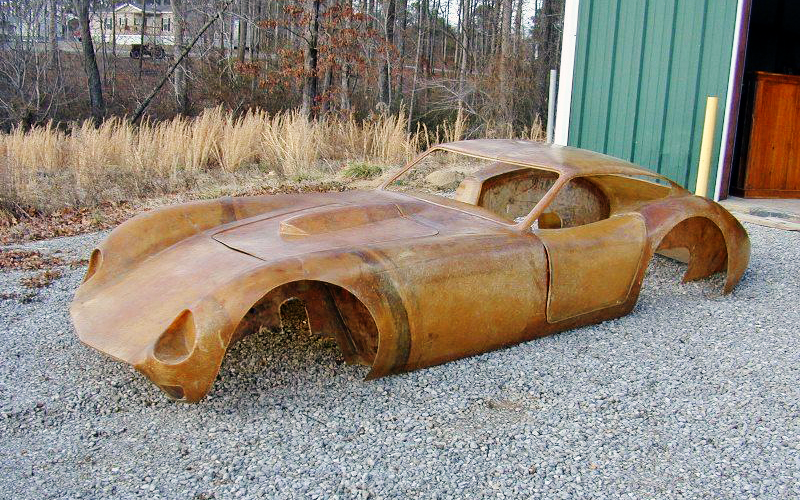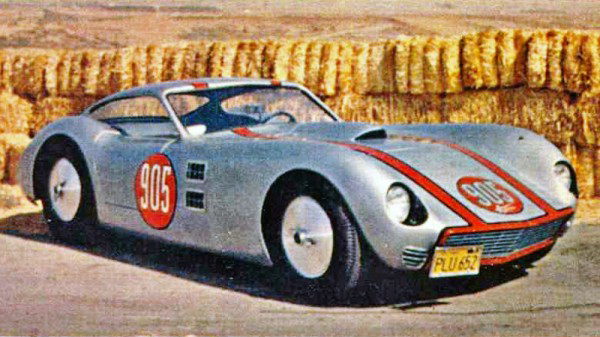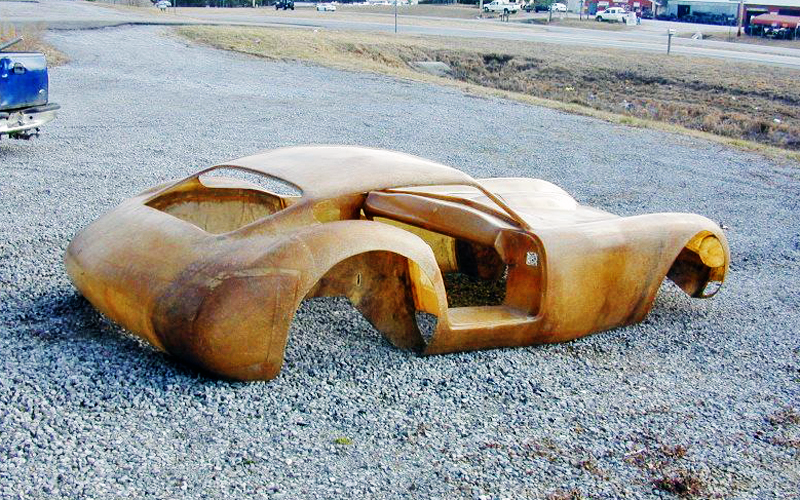Imagination Required: 1959 Kellison J4 GT
It usually takes a little imagination to see the potential of most barn finds, but this find is going to need more imagination as most. It has potential to be an amazing car, but it is going to everything before it can be enjoyed. When we say it needs everything, it literally needs everything. This find only includes a fiberglass body, no chassis, engine, or interior. It isn’t just any old fiberglass tub though. This is a 1959 Kellison J4 Gran Turismo body. This body has been in a barn since new and is still in great shape. If you happen to have a donor car that you’ve been meaning to do something with, check out the auction here on eBay.
The Kellison came out at the peak of kit car popularity and in its day was one of the best kits. While you will need a donor to provide the drivetrain and mechanicals, the body was designed to be mounted to a tube chassis. There are still plans floating around on the internet for building the frame yourself and there are a few sites with information on how to improve the original design. If you’d rather not build a frame, the body can also be mounted to a Corvette chassis, but we wouldn’t want to chop up a ’53 to ’62 Corvette if it were us. Putting this together will be a massive undertaking and may stretch the limits of most DIYer’s abilities. In the end, you would have an incredibly lightweight and unique GT. And as an added bonus of building this one, is being able to customize it to your liking. Hopefully the image above gives you some inspiration of just how cool this could look!
We aren’t sure what this body is really worth, especially considering that there are companies still building these bodies. It looks to be in great condition and we don’t see any signs of delamination or cracking, so if the reserve isn’t much higher than the current bid it would certainly be cheaper to buy this one than a remake. This could make for a fun project with endless possibilities, but will require a little imagination to see its potential. The biggest challenge we would struggle with would be deciding what engine to put under that hood! Would you go with a light weight four cylinder or a high powered, but heavy V8?
Auctions Ending Soon
 2002 Subaru Impreza WRXBid Now2 days$333
2002 Subaru Impreza WRXBid Now2 days$333
 1975 Chevrolet Corvette ConvertibleBid Now2 days$4,000
1975 Chevrolet Corvette ConvertibleBid Now2 days$4,000
 1964 Ford F-100 Camper CustomBid Now2 days$2,000
1964 Ford F-100 Camper CustomBid Now2 days$2,000
 2006 Jeep Wrangler SportBid Now4 days$10,500
2006 Jeep Wrangler SportBid Now4 days$10,500
 1974 Datsun 260ZBid Now6 days$750
1974 Datsun 260ZBid Now6 days$750




Comments
You used to see lots of FG body kits advertised in sportscar and rod magazines back years ago, like the ad in this listing. Most of them were strongly influenced by high-end European designs and looked really good, like this Kellison body. And the price was right–probably the most good looks per dollar you could get anywhere.
I saw a few and was impressed, and I still am. Anyone who could take a body like this and make a secure, finished, running and driving car with it deserves a lot of credit. I couldn’t, because these bodies are pretty crude. You would need to design and fabricate just about everything—mounts to fit the body to whatever chassis you chose, all kinds of large and small systems parts so it would run safely with reliable lights, heater/defroster/ventilation, interior fittings and trim so it would be pleasant to be in and wouldn’t have drafts or leak rain, and on and on. And then I realized that the ‘Glass was a bit thin and would flex, maybe cracking or losing its paint, and wasn’t like the metal that you expect in a well designed and built car.
So they looked good, but I took the easy way out: I bought complete cars that looked good and already ran so they could be driven safely now, rather than X years from now, or in my case, pretty much never. I was impressed by cars made using bodies like this, but I never saw very many of them. They were built and owned by guys with more vision, patience, time, and shop space/tools than I had.
this would be nice to have just to look at ( wall art? ).
Good call, maybe backlit. Sort of a shame because the silver example looks nice. Great find, guys!
OK, let me fire up my creativity here and give this a try. To me, the scariest thing is the lack of glass and hardware as those things would be difficult to fabricate and get right. Then there is the issue of how to title it and register it as a proper vehicle once it is finished. However, let’s assume that those are easy things to deal with. What COULD you do with this body? Well, fortunately it shares chassis dimensions with a C1 Corvette, so there are plenty of ready-made chassis to choose from. Now this doesn’t mean you have to chop up an original Corvette. You can order a custom made chassis for a C1 set up with all of the hard points to take late model Corvette mechanical parts ( I think Art Morrison is one possible source). So, you would get the wonderful modern LSX engine, a six speed manual transmission, huge brakes and great balance all in a package that just bolts together. While you were at it, you could also scavenge the A/C, dash and seats from your donor late model Corvette and modify them to fit. If you are lucky, you might even find a chassis set up to take the newer Vette’s front engine/rear transaxle setup for a perfect 50/50 weight distribution.
Moving on to the body, I am reminded of that Lotus they did on Overhaulin’ and the things they had to deal with due to the very lightweight construction of the fiberglass tub. One of the main things I remember is that they ended up reinforcing the floor with some sort of honeycomb panel and had to do similar work to the seatbelt mounts as they would have failed in a crash. What I would want to do is build a roll cage, but place the tubes as far out of the way as possible so as not to interfere with sight lines in the car ( I believe TVR used a similar method) The seatbelts would then be attached to the cage instead of the flimsy fiberglass body. I would want three point belts, so I would find a way to bolt the buckles through the floor and to the chassis below. I would also consider making the floor and (steel) firewall part of the chassis instead of the body so that the entire shell could be removed from the chassis and still be driveable. I would also want to convert the rear of the car to a hatchback for better overall functionality. The window mechanisms would be simple universal parts designed for street rods and would be power. These are fairly inexpensive systems and could probably be used to replace failed systems in other cars-like the hydraulics in a MB 6.3.
The biggest issue from this part forward is fit and finish. It will take a lot of bodywork to get this raw shell to fit together and look right. It also really needs to be gel coated to seal the surface before paint. Unfortunately, it also appears to be a very crude construction as I can’t see any inner fenders or support for the wheel well lips. I would change that during the build too to add a bit more solidity to the shell as well as an extra bit of protection against road debris damage. In fact, I think most of the shell will need additional reinforcement as it doesn’t look like any wood or other materials were used to reinforce critical stress points.
Trim parts are another interesting question since nothing would just bolt in. I would probably keep the round headlight form factor as it seems most appropriate, but would use bulb shells that could take modern replaceable bulbs and were perhaps set up with HID lenses inside to give more light than would have been available when the shell was new. I would also probably build some plastic covers to blend the headlight recesses into the shell. You might also be able to get headlights that incorporate turn signals in the bulbs and this is what I would do instead of mounting separate lenses. I also feel the taillights should be round as that is how it was done on sportscars of this era. However, here too I would try to use modern materials in old looking elements to add safety and functionality. I could keep going, but this is getting a bit too long!
Jim-Bob, I just love your comments. You come in at an angle so different from mine but you’re so readable.
I don’t think I’d do the rear hatch and you’re right about a roll cage, but it would spoil the pillarless look. Read an interesting article recently where a guy found a Gilbern prototype that was in similar state of incompletion – he had to improvise a lot on the details. I think it was originally specced with a BMC engine and the car was involved in an accident just after he completed it. Undeterred, he put in a new drivetrain based on the Toyota MR2.
Thanks! What I try to do is approach a problem without too many preconceived notions of how it “should” be done. I try to learn from every part of not only the automotive hobby, but other technical disciplines as well, such as open source hardware and software projects. This way I have a lot of knowledge to draw from and can cross pollinate different things together to form a functional whole. Sometimes this means finding a way to rescue a classic car that would have otherwise been only good for parts because original spares cost so much as to put it outside the realm of economic feasibility. Sure the car may not be original and will never be invited to Pebble Beach, but it will be a usable, drivable vehicle for someone who just wants to have it as a car and not as part of an investment portfolio. I just want to see this stuff live again.
I am also someone who is not too far from poverty (I made less than $21,000 last year), so for me it is imperative that I know how to do everything and to do so inexpensively if I want to have anything. One of the things I like learning from is how people in the developing world repurpose technologies to fit their needs. Looking at how people in the former USSR have made do with their Ladas, Moskvitchs, Volgas, etc. sometimes leads me to try things with my Metro (It’s now a 3 seater, with the passenger’s front seat removed for extra cargo space). In the end, I find innovation far more interesting than maintaining the status quo and following a rule book. I respect restorations of important cars but I would never want to do one because restoring one doesn’t answer any new questions. It leaves the engineering up to the original designer and that just seems boring.
I think the amazing part is that someone bought this 55plus years ago, brought it home, then (seemingly) never touched it again! I’ve always been a fan of the old Fiberfab Avenger on the VW plateform, and I wouldn’t mind getting a sound one. The big issue with them seems to be value; because your going to invest as much time and money in building one of these as you will restoring an old car. These cars were limited production, has a limited fan base, and has a build quality that varies from builder to builder. So if one were building a kit car with an eye to resale, you’d have to carefully build a car that the masses will love, i.e. resale red and a quick yet cheap GM 350. But, if your building to keep (which i would do) then you could really have alot of fun! I think the true beauty of these cars are that you can modify and personalize it as much or as little as you like, take it to a show, and never, ever have to hear (or feel any guilt) that you ruined a perfectly good 19blah blah whatevermobile by not restoring the car back to orginal from those who do not share your vision.
I saw a gorgeous silver Kellison competing in a French Alps hill climb race las summer. Too bad I cannot post pictures.
The car was based on a 1950’s Chevy featuring a 283 ci V8. Sounded and looked great!
Many of our faithful readers may not be fully aware of Kellison’s history; I can only piece parts of it together from first hand dealings with Jim Kellison at his shop north of Sacramento.
One of Kellison’s claim to fame, as well as the little dune buggies, was doing the Cobra bodys for Steve Arntz. Apparently Steve and he got into an argument about adding “side-door” penetation protection into the Arznt. Jim want it, Steve didn’t due to cost and weight. Now the rest of that story, as told to me by Kellison, but unconfirmed, – Arntz spun his Arntz into a guard-rail which killed his then girlfiend (Kellison’s ex???). This PO’d Kellison, so he abandoned (his words) the Arntz and moved on to the Stallion. My partner and I built four Stalions, with 351 Clevelands, and one with a Boss 429, The fifth roller went to Victoria, BC and was succesfully completed with a full bore Boss 351 C. The guy that bought the Boss 429 version had that motor yanked and a stove-bolt 429 installed because the Boss would overheat at the hamburger stand with his squeeze! No sh-t, Jack! I’ve lost track of these cars – built in 1979 – 1980. But a facinating look-back for me as a practicing CPA who built cars for a hobby.
Great story. You must have gone to the Peter Kirwin Taylor school of accounting.
keep me subscribed …Reading with interest here
as some of you know I have fibreglass Aussie cars…all I can say is that fibreglass makes such beautiful organic car shapes. it is the car design material of the gods…think of it and you can make it.
This one so low slung a roofline/windscreen back then as if a modern rodder had his hand in lowering it..amazing
ps Jim Bob keep up those long posts my boy…Not only is it interesting but I dont feel so bad when I make my usually long posts..hee hee.
C’mon Rusty, that’s a beautiful body. Why not bring it over?
sure is Don..bring it over…hmmm…no..hee hee
apart from the import costs I am now only chasing a drivable car now to have some fun [sick of pushing around piles of dreams].hence I have let a lot of my project cars go recently.though i am keeping my rare sports cars like this..but this is indeed a beauty…I did once have an Aussie Nota Streamliner body similar styling but without a roof.[alluminium and fibreglass].
I’d build the tube chassis from said plans and go with suspension bits from a c5 vett. Then try and find some sort of modern Mercedes v-8 and try to make it scream like a Zonda, on the cheap or at least as cheap as possible. Add some mid 60’s mag style recreations and paint it a muted silverfish and call it done.
Silverish color.
Holy cow, this brings me back to my childhood. My dad kept a Kellison body exactly like that stashed next to our garage for years…never got around to building the car. I used to play in it.
So, i don’t know if anyone is still following this thread but.. My Uncle had a 58 Kellison J4 coupe in storage for over 40 years. Last year he called me (he is elderley) and asked me if I would be interested in finishing it for him. His comments were that he just wants to see it finished in his lifetime.
Well, I gave him $4k for the body which was mounted on a 1953 Corvette C1 chassis with a built Chev 327 motor out of a 65 Camaro. Since then I sold the chassis and motor and bought a donor 1990 Corvette C4 convertible to build on. I’ve stripped down the C4 and working on fitting the J4 body.
Plan is to build the motor from 245 hp up to max 400 due to light weight of the car, custom fit glass, doors and keep it simple and a muscle car.
Does anyone have any experience with glass or fittings for this car? I’ve found articles on the web that say I can use an old Studebaker windshield and rear glass for a 49 GM car but because of the rarity of the car there’s just not a lot of info. Appreciate any imput. This car by the way is for our family’s use and will not be resold
thanks
Kev